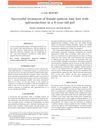 229 citations,
August 2002 in “Experimental Gerontology”
229 citations,
August 2002 in “Experimental Gerontology” AGA causes hair loss by shrinking hair follicles due to DHT binding, and can be treated with finasteride and minoxidil.
 179 citations,
March 2005 in “British Journal of Dermatology”
179 citations,
March 2005 in “British Journal of Dermatology” Oral antiandrogens effectively treat female hair loss, with better results in higher hair loss grades.
 26 citations,
April 2009 in “Australasian Journal of Dermatology”
26 citations,
April 2009 in “Australasian Journal of Dermatology” Spironolactone successfully treated hair loss in a 9-year-old girl.
 14 citations,
April 2006 in “Expert Review of Dermatology”
14 citations,
April 2006 in “Expert Review of Dermatology” Antiandrogen therapy helps treat genetic hair loss.
 November 2024 in “EMJ Dermatology”
November 2024 in “EMJ Dermatology” A new topical treatment using SAMiRNA technology shows promise in increasing hair growth for androgenetic alopecia.
 441 citations,
May 2008 in “British Journal of Pharmacology”
441 citations,
May 2008 in “British Journal of Pharmacology” Anabolic steroids can build muscle and strength but have risks and need more research on their clinical benefits and side effects.
 174 citations,
November 2002 in “Expert Reviews in Molecular Medicine”
174 citations,
November 2002 in “Expert Reviews in Molecular Medicine” Hair loss needs more research for better treatments.
 131 citations,
September 2017 in “Molecular and Cellular Endocrinology”
131 citations,
September 2017 in “Molecular and Cellular Endocrinology” The document concludes that blocking the internal pathways that create androgens might help treat cancers that depend on sex hormones.
 75 citations,
December 2011 in “British Journal of Dermatology”
75 citations,
December 2011 in “British Journal of Dermatology” Female pattern hair loss can be treated with medications, surgery, and cosmetic products, considering its psychological impact.
 68 citations,
May 2011 in “European Journal of Dermatology”
68 citations,
May 2011 in “European Journal of Dermatology” Acne is caused by genetics, diet, hormones, and bacteria, with treatments not yet curative.
 57 citations,
January 1995 in “The American journal of medicine”
57 citations,
January 1995 in “The American journal of medicine” Oral contraceptives help treat hyperandrogenic disorders, improving symptoms like excessive hair and acne.
 56 citations,
January 2015 in “Circulation”
56 citations,
January 2015 in “Circulation” Finasteride helps reduce heart issues and improves heart function.
 56 citations,
February 2006 in “American journal of physiology. Cell physiology”
56 citations,
February 2006 in “American journal of physiology. Cell physiology” Steroid sex hormones activate matriptase in prostate cancer cells but not in breast cancer cells.
 51 citations,
January 2012 in “Annals of Dermatology”
51 citations,
January 2012 in “Annals of Dermatology” Asian hair loss differs from Europeans; consider individual needs and psychological well-being for treatment.
 49 citations,
November 2014 in “Journal of Medicinal Food”
49 citations,
November 2014 in “Journal of Medicinal Food” Red Ginseng Extract may help human hair grow by activating growth pathways and blocking negative effects of certain hormones.
 47 citations,
August 2000 in “Endocrine Reviews”
47 citations,
August 2000 in “Endocrine Reviews” The document concludes that more research is needed to understand excessive hair growth in women with normal hormone levels and regular ovulation.
 42 citations,
May 2013 in “Oral Diseases”
42 citations,
May 2013 in “Oral Diseases” Kennedy's disease leads to muscle weakness without a cure, but exercise and managing symptoms may help patients live a normal lifespan.
 36 citations,
July 2014 in “Neuromuscular Disorders”
36 citations,
July 2014 in “Neuromuscular Disorders” A patient with a larger than usual genetic mutation had a broader range of symptoms for a muscle disease.
 33 citations,
December 2015 in “Neuroendocrinology”
33 citations,
December 2015 in “Neuroendocrinology” Finasteride treatment changes brain steroid levels and receptors, affecting brain function even after stopping treatment.
 30 citations,
December 1999 in “Journal of Investigative Dermatology Symposium Proceedings”
30 citations,
December 1999 in “Journal of Investigative Dermatology Symposium Proceedings” Steroids, particularly estrogens and 5α-reductase inhibitors, affect blood vessel-related hair growth processes in hair follicle cells.
 28 citations,
August 2003 in “Steroids”
28 citations,
August 2003 in “Steroids” Hirsute women have lower type 2 17β-HSD enzyme levels, which improve with treatment.
 25 citations,
December 2017 in “The Journal of Clinical Endocrinology & Metabolism”
25 citations,
December 2017 in “The Journal of Clinical Endocrinology & Metabolism” Birth control pills combined with bicalutamide are more effective at reducing excessive hair growth in women with PCOS than birth control pills alone.
24 citations,
January 2018 in “Indian Journal of Dermatology, Venereology and Leprology” Androgenetic alopecia is mainly caused by genetic factors and increased androgen activity, leading to hair follicle miniaturization.
 24 citations,
January 2013 in “Indian Journal of Dermatology, Venereology and Leprology”
24 citations,
January 2013 in “Indian Journal of Dermatology, Venereology and Leprology” Hormonal treatment is effective for women with acne not helped by usual treatments, especially if they have hormonal imbalances.
 21 citations,
February 2017 in “International Journal of Women's Dermatology”
21 citations,
February 2017 in “International Journal of Women's Dermatology” Hormonal therapies help treat female hair loss, but results are slow and vary.
 19 citations,
October 2017 in “The FASEB Journal”
19 citations,
October 2017 in “The FASEB Journal” Male hormones cause different growth in identical human hair follicles due to their unique epigenetic characteristics.
 19 citations,
April 2014 in “Hormones”
19 citations,
April 2014 in “Hormones” Hormones and genetics play key roles in male and female baldness, which can affect mental health and may be linked to other health issues.
 19 citations,
March 1998 in “Endocrinology”
19 citations,
March 1998 in “Endocrinology” Male rats have more somatostatin neurons than females due to testosterone converting to estrogen during early development.
 18 citations,
May 2020 in “Biomolecules”
18 citations,
May 2020 in “Biomolecules” Spironolactone, a heart and liver drug, has new uses including cancer treatment, viral infection prevention, and skin condition improvement.
 18 citations,
July 2010 in “Expert Review of Endocrinology & Metabolism”
18 citations,
July 2010 in “Expert Review of Endocrinology & Metabolism” The document concludes that PCOS has a strong genetic component, but more research is needed to fully understand the specific genes involved.





























